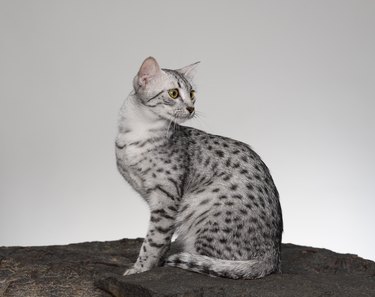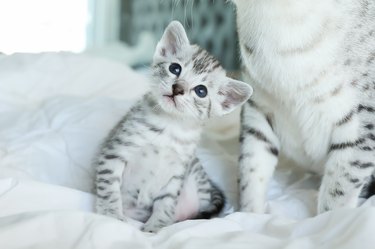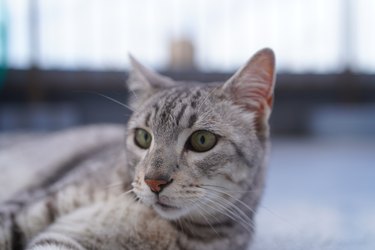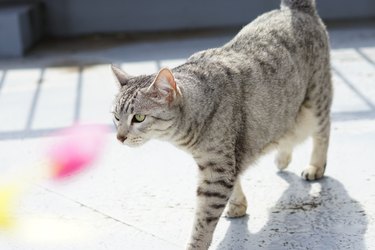
Egyptian mau cat quick facts
Length: 12 - 16 inches
Weight: Females: 10 - 14 pounds, Males: 6 - 10 pounds
Video of the Day
Video of the Day
Lifespan: 10 - 15 years
Coat length: Medium
Coloring: Bronze, silver, and smoke with a spotted coat pattern and green eyes
Grooming needs: Low
Friendliness: Breed alone is not an accurate predictor of individual cats' personalities. However, Egyptian mau cats are generally regarded as loyal and friendly.
Mau is the Egyptian word for cat and the Egyptian mau has the exotic, regal appearance that one would expect from the cats that were revered in ancient Egypt. The cats have a marking on their forehead in the shape of an "M" that is referred to as the mark of the scarab. The breed is quite active and athletic but they are equally affectionate with family members. Their enchanting personality makes these house cats excellent companions for anyone looking for a loyal feline friend. The Egyptian mau is a rare breed, so it may be difficult to find a breeder and you may need to wait for a kitten to be available.

Egyptian mau cat history
The Egyptian mau originated in Egypt, although much of the breed's history is unknown. Ancient Egyptian art depicts spotted cats with a similar appearance and may be ancestors of these domestic cats. Like many other breeds, the Egyptian mau was at risk of extinction following World War II and many of the breeding records from before the war were lost.
In 1956, exiled Russian Princess Nathalie Troubetskoy brought the first Egyptian mau cats into the United States from Italy. While breeders around the world have saved cats from extinction, they are still considered a rare breed.
Although the mau has a spotted coat that is more common in wild cats such as cheetahs and African wild cats, the spotted coat on this domestic cat breed is naturally occurring. The Cat Fanciers' Association (CFA) recognizes three colors: bronze, silver, and smoke. The cats do come in other colors, but they aren't eligible for the show ring. Other colors include:
- black
- blue
- blue silver
- blue smoke
- blue spotted
Coat color isn't the only distinguishing feature of these beautiful cats. They also have almond-shaped eyes and the only accepted eye color is gooseberry green. Other traits include a rounded, wedge-shaped head, mascara lines on the cheeks, and hind legs that are longer than their front legs which gives them the appearance of a tiptoe stance.
Egyptian mau cat personality
Egyptian mau cats have the energy and athleticism to live up to their wild appearance. They don't tend to be hyperactive, but they love to jump and run. They have a flap of skin on their belly that allows them the mobility for their playful antics and they have a gait like a cheetah that makes these cats extremely fast. These cats tend to love water and they may learn to turn on water faucets.
The cats are also quite social and enjoy interactive playtime. They expect to be an active part of your life and will likely help you wake up in the morning and may even ride on your shoulder as you move around the house. Despite their high energy levels, the Egyptian mau is also very affectionate and loves to cuddle during their downtime.
While the breed is typically very outgoing with their family, this outgoing nature does not typically apply to strangers and your first impression may be that the cat is reserved and shy. In many cases, the Egyptian mau will form a strong bond with one member of the family, which is important to keep in mind when considering an Egyptian mau kitten for your family.
The cats have gentle personalities and may be easily startled by loud, unexpected noises. It is important to socialize kittens while they are young so they aren't fearful of strangers. The cats can be talkative and their vocalizations often sound like chortles and trills.

Egyptian mau cat lifespan and health issues
Healthy can live 15 years or longer with excellent care and while the Egyptian mau breed is generally healthy, they are at risk for a few health problems. Some potential concerns include:
- leukodystrophy: a neurological condition in which the cat is unable to produce myelin
- pyruvate kinase deficiency: a condition that affects the lifespan of red blood cells and can lead to anemia
- urolithiasis: a condition that causes stones to build up in the urinary tract
Responsible breeders will test for these conditions when possible and avoid breeding any cats known to carry these diseases. When selecting an Egyptian mau kitten, it is important to discuss the breeding cats' health history and test results.
Egyptian mau cat grooming and care
The Egyptian mau has a medium-length coat that is easy to care for. Smoky cats tend to have fur that is fine and silky while bronze and silver cats have fur that is dense. In most cases, you only need to brush the cat's coat once per week to keep it shiny. Other grooming tasks include:
- checking and trimming the cat's nails
- checking and cleaning the cat's ears
- brushing the cat's teeth with a toothpaste that is formulated for cats
Feed the cats high-quality, commercial cat food as recommended by your veterinarian. Consider feeding the cat canned food rather than dry food. The added water content can help keep your cat hydrated and reduce kidney and urinary tract issues. Make sure fresh water is available at all times. Take your cat to the veterinarian for regular check-ups and vaccinations.

Welcoming a new cat into your home
Take the time to prepare your home for your new kitten's arrival. Cat-proof the home to make sure it is safe for your new cat and set up a single room where you can introduce your cat to their new home. Make sure the room has everything your cat may need including:
- food and water
- litter box
- cat tree
- scratching post
- cat toys
When your new cat arrives, allow them to explore the room at their own pace. It is important to spend time with the new kitten, but avoid pressuring them to be held or petted before they are ready. Remember that the Egyptian mau tends to be shy with strangers, so it may take some time for them to get to know you.
Offer to play and use plenty of positive reinforcement. Once they are comfortable with you and their new environment, you can open the door and give them access to more of the home. Your patience will pay off and soon your new cat will be an active and loyal member of the family.